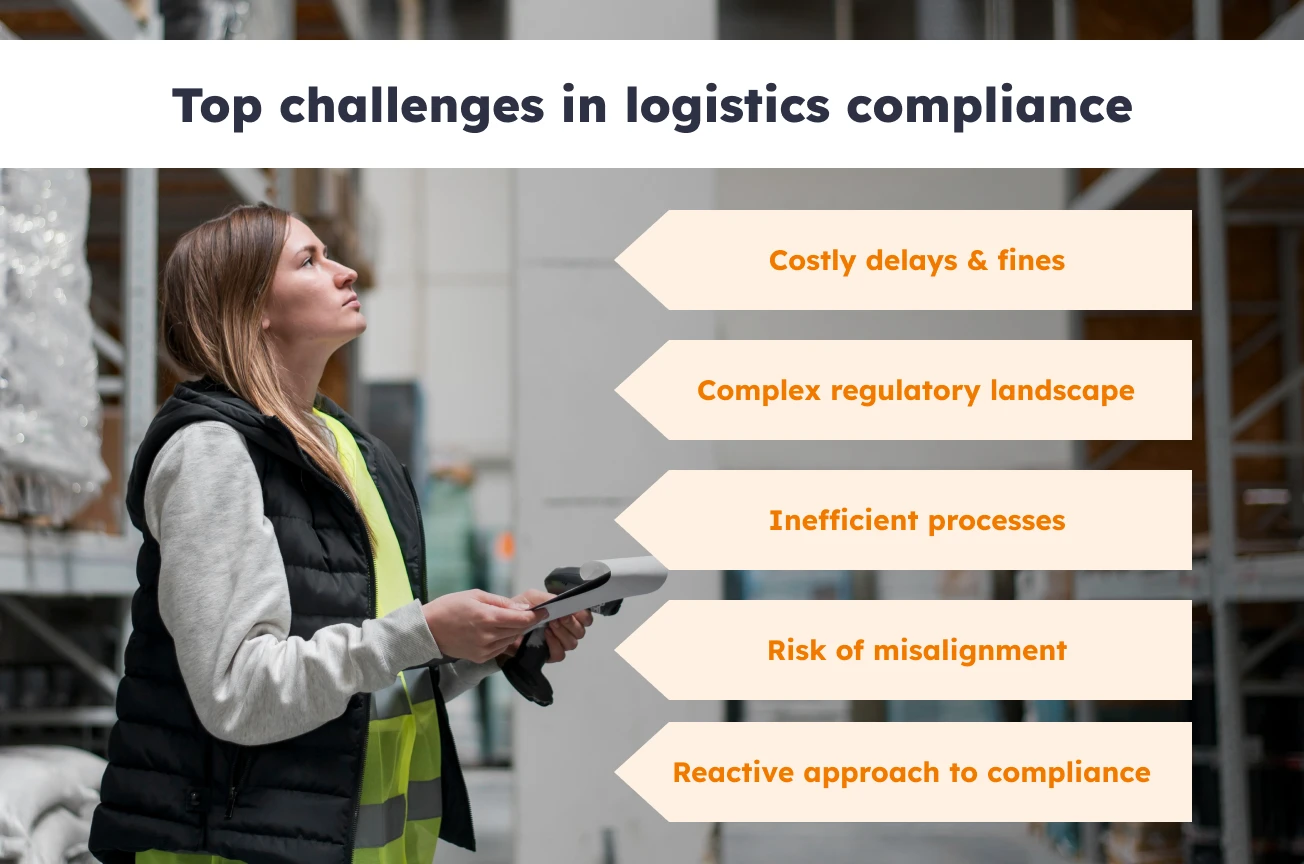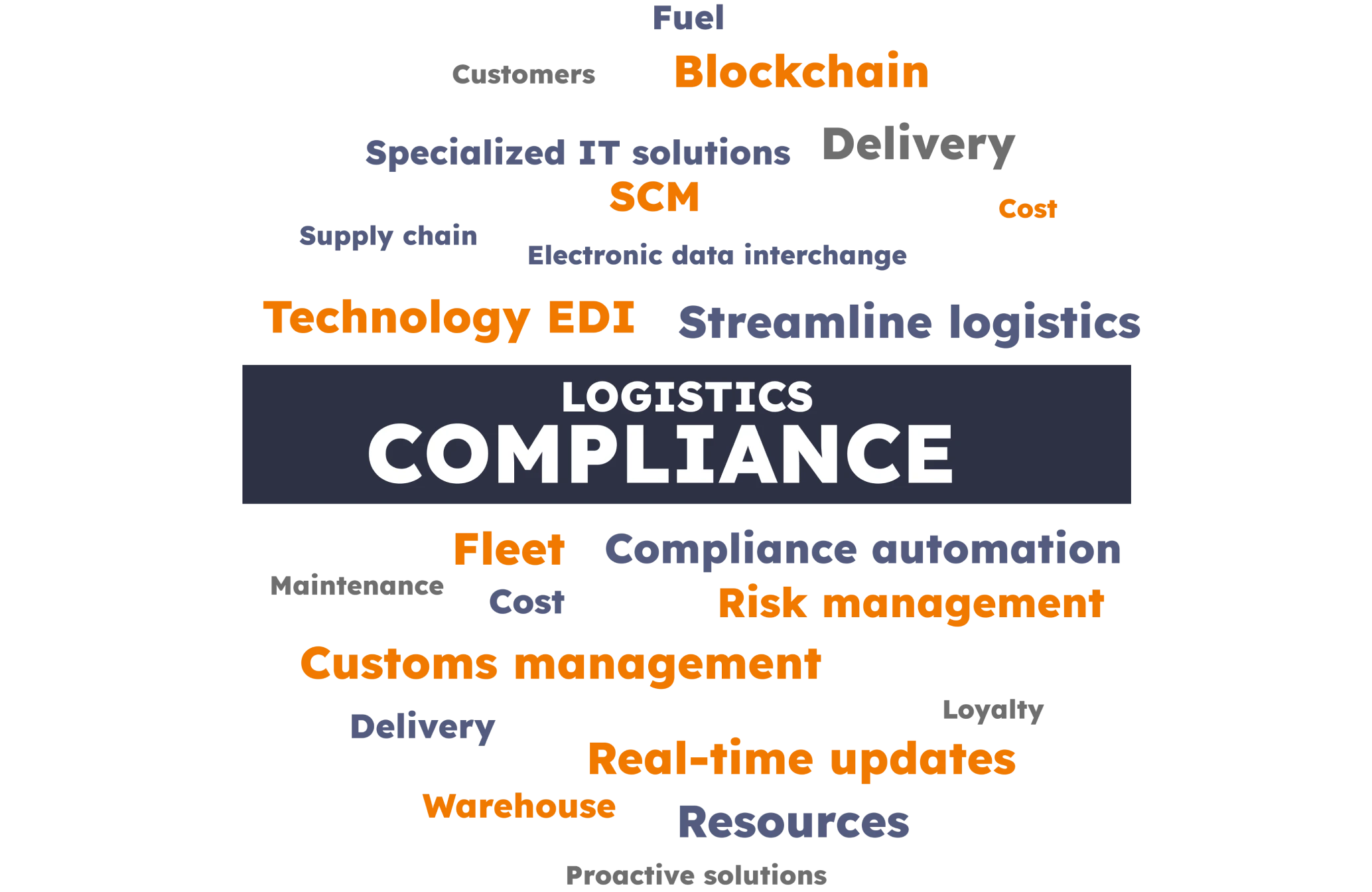
Logistics compliance management: Building trust and mitigating risk through tech

Paul Kirikov
Head of Business Development at Modsen
Logistics isn’t just about moving goods from Point A to Point B. It’s about guaranteeing that every step of the journey adheres to an intricate web of local and global regulations. For logistics professionals, what is logistics compliance isn’t an abstract question – it’s a daily operational reality.
It impacts delivery timelines, costs, and customer satisfaction, elevating compliance in logistics from a routine task to a cornerstone of operational excellence. Grasping its scope and role is the first step to turning it into a strategic advantage. And it’s time for you to take the leap.
Logistics compliance: A challenge, an opportunity, and a necessity

Have you ever calculated the cost of a single shipment delay caused by missing paperwork or an overlooked regulation? I’m not just talking about fines or angry customers (though they matter too) but a chain reaction that disrupts schedules, inflates expenses, and weakens partnerships.
The World Bank’s Logistics Performance Index flags customs and regulatory challenges as major barriers to efficiency, especially with rules shifting across regions and industries. Navigating this complexity involves coordinating diverse partners, each with unique local laws and standards. Not to mention that the missed details can mean delays and a costly breakdown across the supply chain.
Inefficiencies add another layer of risk. Think customs delays: one error in documentation doesn’t just halt a shipment – it ripples across operations. Addressing supply chain compliance issues demands more than vigilance. It requires embedding compliance into processes, transforming it from a hurdle into an opportunity for efficiency and collaboration.
The question is: how do you go from firefighting to foresight? The answer lies in technology that turns logistics regulatory compliance into a competitive advantage.
Can technology really solve your logistics compliance problems?
The short answer? Absolutely. But when was anything in logistics ever that simple? The real question is, how far do you want to take it? What happens when a new regulation blindsides your operations overnight? Do you have a system that adapts in real time, or do you find yourself scrambling to avoid costly delays and fines? The right technology doesn’t just keep you afloat – it empowers you to navigate the storm with confidence and control.
Take a well-designed supply chain compliance system, for instance. It doesn’t just monitor regulations across jurisdictions; it automates key processes like document validation and cross-border checks, lightening the load on your team and minimizing disruptions. With this, compliance in supply chain transforms from a burden into a competitive advantage.
Of course, even with the best technology, success requires the right partner – a team that understands the nuances of global supply chain compliance and tailors solutions to fit your unique needs.
Specialized IT solutions for global supply chain compliance

I won’t deny it, my team is one of those. But I’ve never believed in the shortcut of just saying ‘Technology is the answer’ – there’s always more to the story. So, how exactly can specialized IT solutions make compliance in your supply chain easier and more effective.
EDI compliance in logistic
Managing document exchanges between partners across regions is one of the biggest compliance challenges. EDI (Electronic Data Interchange) automates the entire process, from customs declarations to shipping notices. But success lies in customizing EDI compliance to your specific needs. When tailored correctly, EDI ensures seamless, error-free exchanges across your global network, streamlining your logistics compliance management.
Supply chain management software
For smooth operations, Supply Chain Management (SCM) software acts as the control tower, overseeing compliance at every stage. SCM integrates regulatory requirements directly into workflows, making sure all standards – whether local or international – are met. A centralized system keeps compliance in the supply chain maintained across all partners, locations, and products, minimizing costly mistakes.
Customs management software
As you move goods across borders, customs management software becomes your best friend. It guarantees that every tariff, duty, and import/export requirement is accounted for. With real-time updates on global supply chain compliance and automated checks for regulatory changes, customs software keeps shipments on track, preventing delays at borders and reducing penalties from regulatory bodies.
Compliance with blockchain
Now, here’s something revolutionary: blockchain. Picture a system where every transaction is recorded transparently and securely. No more worries about data manipulation or missing paperwork. Blockchain creates an auditable, tamper-proof ledger that makes your supply chain compliance 100% trustworthy. When every step of your operation is recorded, you have solid proof that compliance standards have been met – from start to finish.
Real-time customs updates
Regulations change quickly – what was a matter of compliance logistics today might not be tomorrow. Real-time customs updates keep you ahead of those shifts, providing instant alerts whenever there’s a change in regulatory requirements. This means you can adapt on the fly, keeping your operations in sync with the latest rules and preventing delays or fines due to outdated knowledge.
Risk management platforms
No one likes surprises when it comes to business. Effective compliance management in logistics involves identifying risks before they happen. Risk management platforms do just that, using predictive analytics to foresee potential compliance issues across your supply chain compliance system. By flagging these risks early, you can address them proactively, avoiding disruptions that could cost your business time, money, and reputation.
Compliance automation tools
And finally, what if you could automate all those repetitive compliance-related tasks – like document validation, regulatory checks, and reporting? That’s exactly what compliance automation tools do. They integrate directly into your operations, freeing up your team to focus on growth while automation takes care of the details.
The final word: Compliance as your strategic shield
What’s the common thread? Every logistics compliance solution, from automation tools to blockchain, works best when tailored to your unique operations. Whether it’s global supply chain or external supply chain compliance, the right technology doesn’t just make processes smoother – it transforms compliance into a competitive advantage.
But regulations go beyond just following rules. Supply chain security compliance is your safeguard, protecting your operations from disruptions, regulatory penalties, and even reputational damage. Think of it as the backbone of a resilient, future-proof supply chain – one that not only withstands challenges but thrives in the face of them.
But here’s what truly matters: Are you ready to embrace compliance not as a cost of doing business, but as a catalyst for growth? If so, it’s time we had a chat and discussed the possibilities. What do you say?

Get a weekly dose of first-hand tech insights delivered directly to your inbox